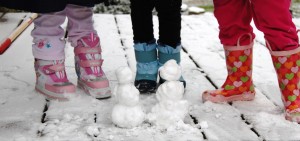Faithful friends are a sturdy shelter:
whoever finds one has found a treasure.
Faithful friends are beyond price;
no amount can balance their worth.
Faithful friends are life-saving medicine;
and those who fear the Lord will find them.
Those who fear the Lord direct their friendship aright,
for as they are, so are their neighbors also.
— Sirach 6:14-17
In the past week, as I do a quick look back and assessment (examen) of the time, I notice a significant theme. A week ago I took a walk with a friend and talked my heart out. And listened, too. What a sturdy shelter. Over the days that followed, I was able to see and spend a little time with two friends that I don’t see in person all that often. The week has also included well-wishes, phone calls, gifts and food from friends. And then there was the unexpected hospitality on snowy afternoon, and unanticipated joy shared with friends and new acquaintances . . . which may turn out to be friends. I realize that my life is full of the goodness of friends. Treasure indeed.
Also this week I read an interview with Robert Putnam about the book he has co-authored with David Campbell, American Grace. It makes available the findings of their important new study of religion in America. They have discovered a number of significant trends. One that stood out to me is captured in these quotes:
We find that people who are active in religious communities are systematically more generous, better neighbors. They’re more likely to work on community projects. They’re more likely to give to secular causes as well as religious causes. They’re much more likely to volunteer for secular causes as well as religious causes. They’re more likely to give blood. They’re more likely to let a stranger cut in front of them in line.
In fact, even if you don’t believe in God at all, and you’re not all that religious, but you go to a lot of church suppers, say, because your spouse is religious, you’re just as good a neighbor as somebody who is deeply religious and goes to church.
Conversely, if you are unbelievably deeply religious, you pray every day, five times a day, and you say that religion is the most important thing in your life, but you sit alone in the pews and pray alone and don’t have friends in church, then you’re, statistically speaking, not any better a neighbor than a secular person is.
So it’s a pretty strong relationship. It’s not so much faith as communities of faith that seem to make people nicer.
This finding opens up one of my own theological commitments to understand how practice shapes our faith and faithfulness as much or more than belief. It also dawns on me that apparently I have a lot of friends who are regulars in their faith communities. All the ones I’ve interacted with this week, and mentioned herein, fit this bill exactly.
This study and my own experience also lead me to wonder . . . why it is such a challenge to extend friendship? Why is it so hard sometimes to reach out to others, including those who desperately need friends, by welcoming them genuinely into our households of faith? Putnam and Campbell get at that as well, and that is a post for another day.
The friends who have appeared this week are not only kind and generous, and seem like living illustrations of Putnam and Campbell’s findings, they also embody the wisdom of Sirach. Faithful friends – those invested in their communities of faith – make the best friends in every way. And for me they are just the life-saving medicine I need, infusing my days with grace and joy.




